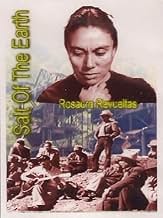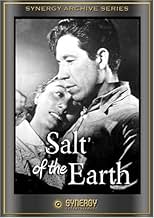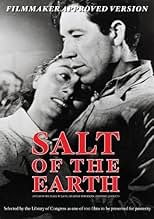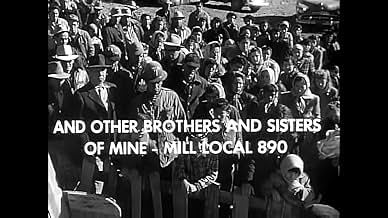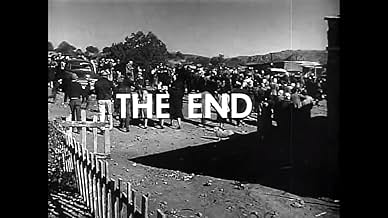Ajouter une intrigue dans votre langueMexican workers at a zinc mine call a general strike. It is only through the solidarity of the workers, and importantly the indomitable resolve of their wives, mothers, and daughters, that t... Tout lireMexican workers at a zinc mine call a general strike. It is only through the solidarity of the workers, and importantly the indomitable resolve of their wives, mothers, and daughters, that they eventually triumph.Mexican workers at a zinc mine call a general strike. It is only through the solidarity of the workers, and importantly the indomitable resolve of their wives, mothers, and daughters, that they eventually triumph.
- Prix
- 4 victoires au total
- Ramon Quintero
- (as Juan Chacon)
- Barton
- (as David Wolfe)
- Consuelo Ruiz
- (as Angela Sanchez)
- Charley Vidal
- (as Ernest Velasquez)
Avis en vedette
My grandfather was a coal miner in southern Colorado, and the coal-mining industry (and its effects on Hispanos of the Southwest) has been an interest of mine all of my life. Quite simply, this film brought history to life for me. The actors, location, themes, language, and other details were so authentic, that I felt I was watching a documentary at times. I felt a spiritual connection to my grandparents, who lived and worked in coal mining camps in the early part of the 20th century. I grew up hearing their stories, and the devastation of the Colorado Coalfield Wars and the Ludlow Massacre.
This is, quite simply, a stunning cinematic achievement, especially given that it was written and filmed in 1954. Sadly, many of the prejudices and themes in the film resonate today. Little has changed for many of the hardworking Hispanos who have called the Southwest home for centuries.
Against this backdrop, Salt of the Earth appears to have parachuted in from another planet. In retrospect, the film's look, feel, and values, plus use of non-actors, represent an anti- Hollywood aesthetic in just about about its purest form. Instead of the usual ersatz, there are company shacks, a desolate land, and real workers sometimes speaking a foreign tongue about hot water and labor solidarity. This was and is about as far removed from the fabled dream factory as any commercial film before or since. To my knowledge, Salt is the only professional movie made in America by known communists. And though I've seen it a number of times, I've yet to detect a theme that any conscionable liberal would disagree with. The emphasis throughout is on reform, not revolution.
So why was the movie so thoroughly ostracized. Aside from the obvious negatives, there are two aspects that challenge patriotic assumptions about the power of the individual. The strikers win because of their solidarity, that is, their capacity to overcome internal divisions in pursuit of common goals. But more importantly, theirs is a leaderless solidarity. Unlike so many other labor films, no one person arises in Salt to take charge or direct the actions of the others. No single iconic personality dominates. Community of labor is the real agent of change and victor here, while no one individual can be pointed to as indispensable. Second, through the pivotal role of Esperanza (a professional actress), the individual is shown as flowering amidst the common effort. Far from being submerged in a faceless mass, she discovers through participation a heightened sense of individualness and a wealth of hidden talents. Moreover, a stronger, more confident Esperanza means a stronger, more confident strike effort. In short, it's not individuality versus the group, but individuality from within the group. I don't know how subversive these ideas ultimately are, but I do know they challenge decades of iconic film-making, in which the omnipotent movie star, a John Wayne or a Sylvester Stallone, is transformed into a demi-god and exalted above the common folk. Against this grain, Salt seeks to empower its audience, not dis-empower.
There are many fine touches in the film. I'm glad the workers are not romanticized, nor are the bosses or their law-enforcement allies caricatured. Instead the hardscrabble families are treated as ordinary people, able, nevertheless, to act intelligently beyond the cultural limits placed upon them. Ordinarily, the viewer would expect a heavy hand with such politically charged material; however, the producers have the good sense to hew to a lighter approach that features unexpected deposits of humor, as when the men whine about being forced to hang out the wash. This furnishes both a good laugh and an incisive piece of social commentary. In fact, most of the movie's considerable humor comes from its strong feminist subtext, certainly a striking exception to the Ozzie and Harriet stereotypes of the period.
Despite an obvious appeal to cultural historians, Salt is much more than a mere artifact. There is, of course, no more Mc Carthy-led purge, and miners' wives have long since gotten hot water and indoor plumbing thanks to labor militancy. Nevertheless, the film's social themes continue to reach beyond that long-ago period. Women continue to strive for equality, just as the workers' wives in Salt struggled as domestics against the chauvinism of their husbands. Moreover, the need for racial equality remains as pressing now as it was in Michael Wilson's prescient screenplay. And, of course, there's labor's ongoing battle to get something like a fair share of the wealth it produces. Far from being a dead artifact, the power of this suppressed treasure along with the courage of the men and women who made it, continues to echo across the decades, furnishing inspiration to generations to come.
That alone is praise!
SALT OF THE EARTH, a powerful film shot on a threadbare budget, mostly with local non-actors, was branded as "communist propaganda" during the infamous McCarthy "Red Scare" and was hardly shown in the USA when first released. However, the film was widely exhibited in Europe, where it was lauded with acclaim. It wasn't until the 1960's and 1970's that anyone in the USA had a decent chance to see this powerful work, and then only in film festivals, union meetings, or college campuses.
It is not propaganda. It is about the struggle for dignity and recognition. The making of this film it testament to that alone! For fear of destruction by "anti-communist" technicians, the film stock had to be smuggled into development labs and worked on in secret! Director Herbert J. Bieberman was arrested during filming, and had to give scene directions by letter and telephone while in prison.
The film the U.S. Government didn't want you see...now part of the National Film Registry. Consider watching this as driving a stake through Joe McCarthy's heart.
Le saviez-vous
- AnecdotesBecause the producers feared both sabotage and destruction of the film, the exposed footage had to be developed in secret, at night, by a sympathetic lab technician, with the film delivered in unmarked canisters.
- GaffesWhen Ramon is in the bar, his hands change position several times between shots.
- Citations
Esperanza Quintero: Whose neck shall I stand on to make me feel superior, and what will I have out of it? I don't want anything lower than I am. I am low enough already. I want to rise and to push everything up with me as I go.
- Générique farfeluOpening credits prologue: our scene is NEW MEXICO LAND OF THE FREE AMERICANS WHO INSPIRED THIS FILM
HOME OF THE BRAVE AMERICANS WHO PLAYED MOST OF ITS ROLES.
- ConnexionsFeatured in Precious Images (1986)
- Bandes originalesWe Shall Not Be Moved
(uncredited)
Traditional
Sung by the women on the picket line
Meilleurs choix
- How long is Salt of the Earth?Propulsé par Alexa
Détails
- Date de sortie
- Pays d’origine
- Langues
- Aussi connu sous le nom de
- Das Salz der Erde
- Lieux de tournage
- sociétés de production
- Consultez plus de crédits d'entreprise sur IMDbPro
Box-office
- Budget
- 250 000 $ US (estimation)
- Durée1 heure 34 minutes
- Couleur
- Mixage
- Rapport de forme
- 1.33 : 1
Contribuer à cette page



